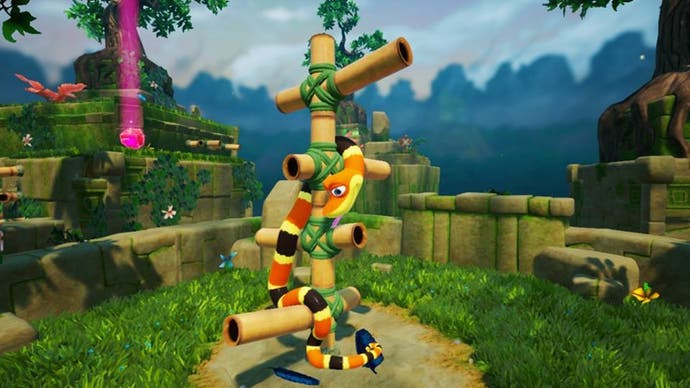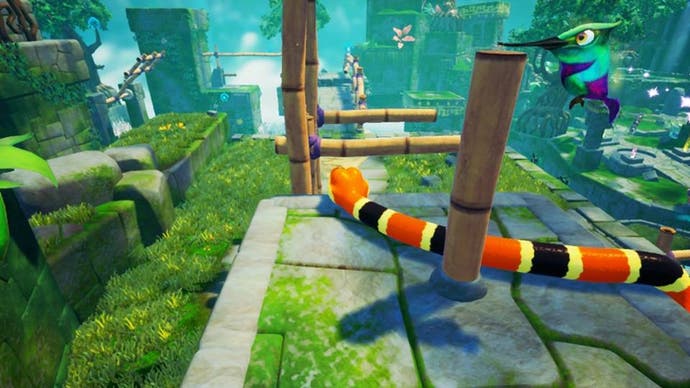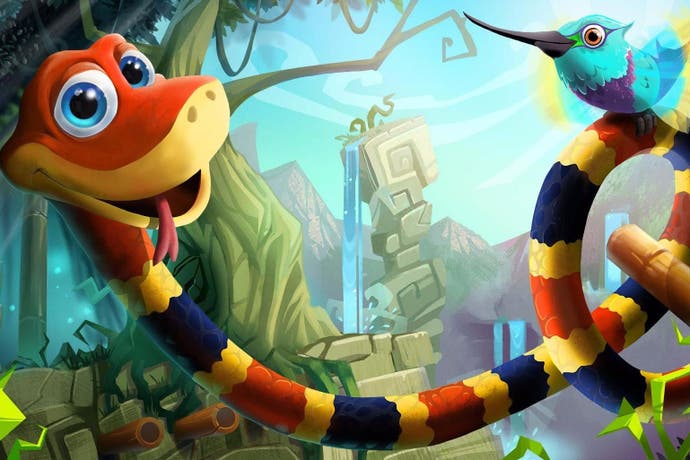Snake Pass review
Solid snake.
Here's an adage as dog-eared and cheerily British as its subject; you wait ages for a classic platformer in the style of Rare's N64 classics and then two come along in quick succession. We're weeks away from the release of Yooka-Laylee, Playtonic's vibrant throwback to the Banjo-Kazooie series, but before then we have Snake Pass. It's similarly in thrall to a sugar-sweet flavour of game once popular at the turn of the century, full of colour and a disarming charm.
Its lead character Noodle the snake and his companion Doodle the hummingbird are keen students of the syllabus taught at the Rare School of Design in the late 90s, yet it goes beyond placing googly eyes on a couple of animals. Snake Pass takes the business of being a snake very seriously.
Rather than running and leaping across levels, here you slither across them, contorting yourself across and around obstacles to reach new areas. To gain forward momentum you must push down on the right trigger while sliding from side to side, and to work your way up a bamboo climbing frame you must coil yourself around it, tightening and loosening your body with the left trigger as you go. The execution is sublime, the animation masterly as it translates the tics of the natural world into the abstract of the puzzle platformer (something as true of Doodle as it is Noodle, the hummingbird darting around the screen as he draws your attention to wherever the level designers want to send you next).

More importantly, the feel is just wonderful. Developer Sumo Digital cut its teeth porting Sega arcade classics such as OutRun 2 and Virtua Tennis - indeed this is its first solo effort - and there's a craft here it's inherited from the greats. It's there in the background, in the raindrops that drop on taut drumskins dotted through each level or in David Wise's elegantly blissed out soundtrack, and it's there in your hands too. Snake Pass is a platformer that, like the very best in the genre, is dedicated to its own sense of movement.
The end result is both novel and coherent, and while Yooka-Laylee plays its cover version of Rare classics relatively straight, Snake Pass does well to offer its own unique twist. This is that beautiful contradiction that's all too rare (if you'll pardon the pun); a game that's powered by a warm, fuzzy nostalgia and yet is like nothing you've ever played before.
A shame, then, that such a neat and well executed core concept is often undone by more pedestrian problems. The imagination of the central mechanic is never quite met by the levels themselves, in which you must collect three jewels to progress while collecting optional gems and coins placed in deviously hard to reach corners. There are lava pits, wind-blown chasms, moving platforms and levers to hit, but there's never anything that seems particularly well tailored to the moveset at hand.
More damningly, Snake Pass is compromised by an infuriatingly dumb camera. Each action must be framed yourself, and for a game that's built upon its counter-intuitive controls it's asking too much for players to have to wrestle with the camera at the same time. It's also asking too much to have players put up with a checkpoint system that's similarly malign. Progress is saved at various gates in each level, yet they're sparingly placed, forcing you to slowly snake your way back to some of the more challenging obstacles before quickly falling to your death once more. It's needlessly frustrating.

Perhaps the heightened challenge is intended as part of the old school charm, but for all its retro aesthetic there's a modernity at the heart of Snake Pass that isn't met by elements of its own design. Physics-based platformers such as this are fuelled by a sense of slapstick - as evidenced by the cute guffaws from Noodle as he tumbles once again - yet in Snake Pass you're too often the one getting a shovel to the face without any due recourse.
They're problems worth seeing through, however, for the zest and warmth that's on show. It has its issues, but Snake Pass is a work of wit and craft that does more than ape 3D platformers of old: it matches their ingenuity as well as their look, making this feel as fresh now as those classics did back in their day. It's just a pity that a small clutch of problems sees greatness slither through its fingers.

